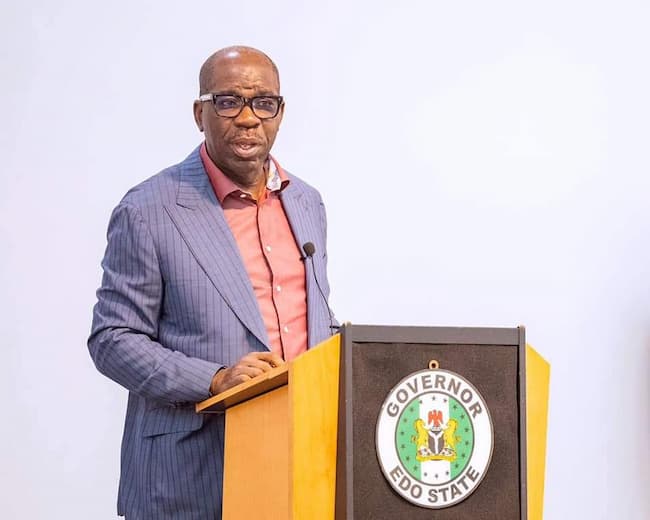Governor Godwin Obaseki of Edo State has said the nation spends about $500 billion (N300 billion) annually on the importation of dairy products, reiterating the need for the country to refocus on agriculture and production to drive economic growth and development.
The governor said this when he received a team from Heifer International, who were on a courtesy visit at the Government House, in Benin City.
He noted that his government is prioritizing agricultural production, sustaining investment in the sector to boost the state’s economy, tackle food insecurity and create wealth for citizens.
According to him, “We have a small State of about five million people, 70 percent of the people are under the age of 35 years, and need to make them know and understand that we don’t have the dollars to import food anymore as Nigeria spends about half a billion US dollars importing dairy products.
“Food and food security is very huge, particularly protein sufficiency for the mass of our people, especially children. We are a rich country with a rich and huge population and at some point in our history, we turned from agricultural production as we found crude oil and felt we have enough petrol, naira, and dollars to keep ourselves going forgetting that sometimes in our life we need to produce what we will eat.
“We became poor by exporting all we needed including food and food items. We spend billions of naira and dollars annually on the foods we can produce on our own.”
He continued: “My administration thrives on partnership. As a government, we see our role as one that enables things to happen. As enablers, we see our role as being able to mobilize resources, particularly human capacity, and knowledge, and direct them into areas of priority as we see.
“Interestingly, we have partners and we try to start something in the area of agriculture but have some difficulties and are making efforts to tackle them. We have gotten a commitment from our partners to make an investment in a modern farm from where we will propagate day-old chicks and get them into the market.
“It’s a long way to go and a lot of work but we are glad with the support and technology from the front end and understand that we need to go back the value chain and think of how to produce the grains, vitamins, feeds and all needed to grow the poultry business.”
Reeling from the gains of the government’s investment in agriculture, the governor said, “Last year, we put out 60,000 hectares of new farmland for estate farmers in oil palm which is under cultivation. For us, the lessons out there are to work with our partners to build the institution to train human capacity, extension workers, and farmers to help us understand what is going on, support the farmers and monitor what they are doing to guarantee their yield and help them make money and sustain their business.
“As a government, we are making the investment within the government, shaping our understanding and moving from an era in which government used to invest to the one where the government enables investment. It’s not an easy transition but as a government, we are continuing to make those investments and maintain the focus.
“Our relationship with Heifer International is the one we cherish. 79 years of existence and knowledge is not a small feat to achieve and we are excited you are here to see what we are doing and will do our best to utilize this opportunity of our partnership.”
Earlier, the leader of the delegation, Hilary Haddigan, while commending the government’s commitment to ensuring food security said, “We represent over 500 partners and donors that support our work. Our vision is to end poverty and care for the Earth while our mission is to support 10 million smallholder farmers.
“We have met with farmers in the State who are preparing to receive poultry products. We thank you for bringing happiness to the lives of smallholder farmers here in Edo State and would like to partner with your administration.”











